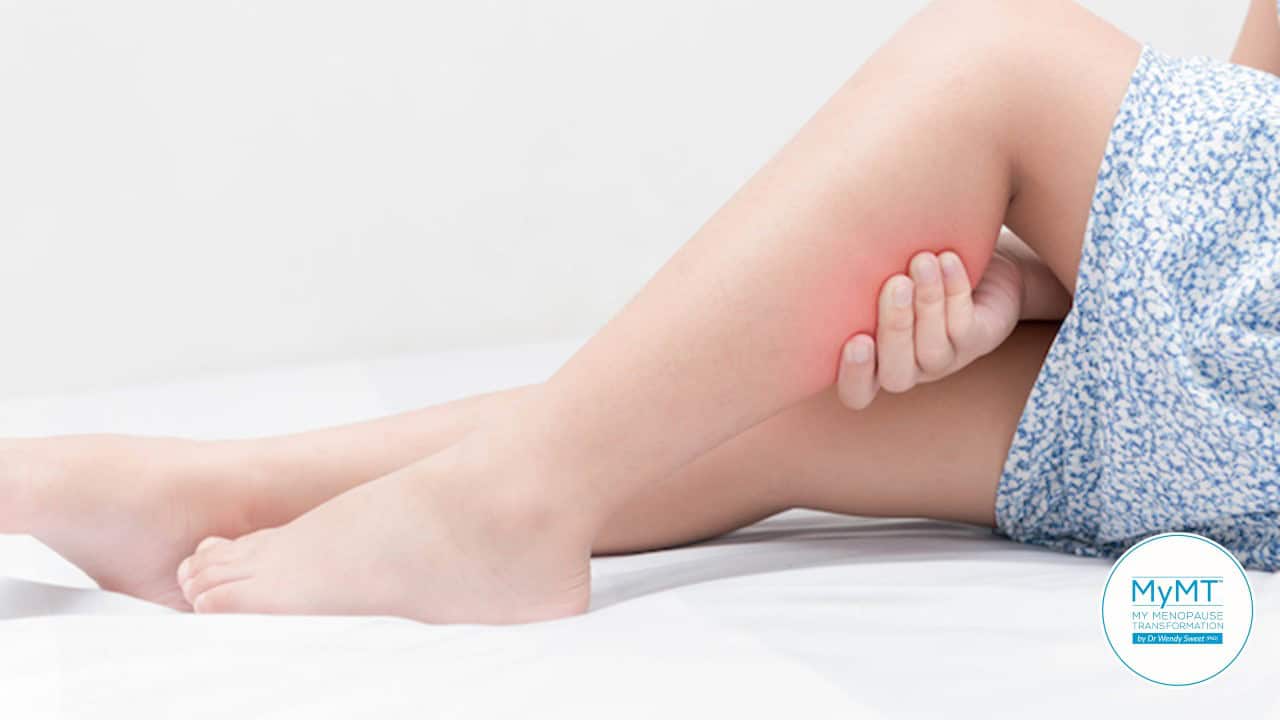If it wasn’t his snoring keeping me awake, it was my aching, cramping, jittery legs.
Sometimes my hamstrings would cramp up, sometimes my legs would twitch, sometimes the aching would keep me lying awake for hours.
Standing on the cold tiles of the bathroom floor helped a little bit, but doing this at 3am wasn’t really helping my desperation for sleep.
There’s nothing like the feeling of muscles that take on a mind of their own when you’re trying your hardest to sleep. Restless Leg Syndrome isn’t fun. But at the time that I was experiencing the cramping and twitching, I didn’t realise that it was a symptom of menopause.
But is it really?
Lying in bed thinking about the nerve and muscle contractions or ‘twitching’ that I was experiencing made me immediately think about neuro-muscular (nerve-muscle) physiology and nutrition. A topic that I had taught Sport and Exercise university students for years.
In female athletes, there are factors that influence muscle cramping and muscle ‘twitching’. I didn’t know that these changes also apply to women in their menopause transition, especially if they are active.
Low iron, low Vitamin D, inadequate intake of calcium and magnesium to match the changing structure of our muscles (including cardiac muscle) during menpause and Irritable Bowel Syndrome [IBS] – all of these factors impact muscle physiology and Restless Leg Syndrome too.
Some studies also suggest that there is a bidirectional relationship between Irritable Bowel Syndrome (IBS) and Restless Leg Syndrome … especially in women. And for those of you who experience both of these concerns, you know that night after night, it can affect your ability to remain asleep.
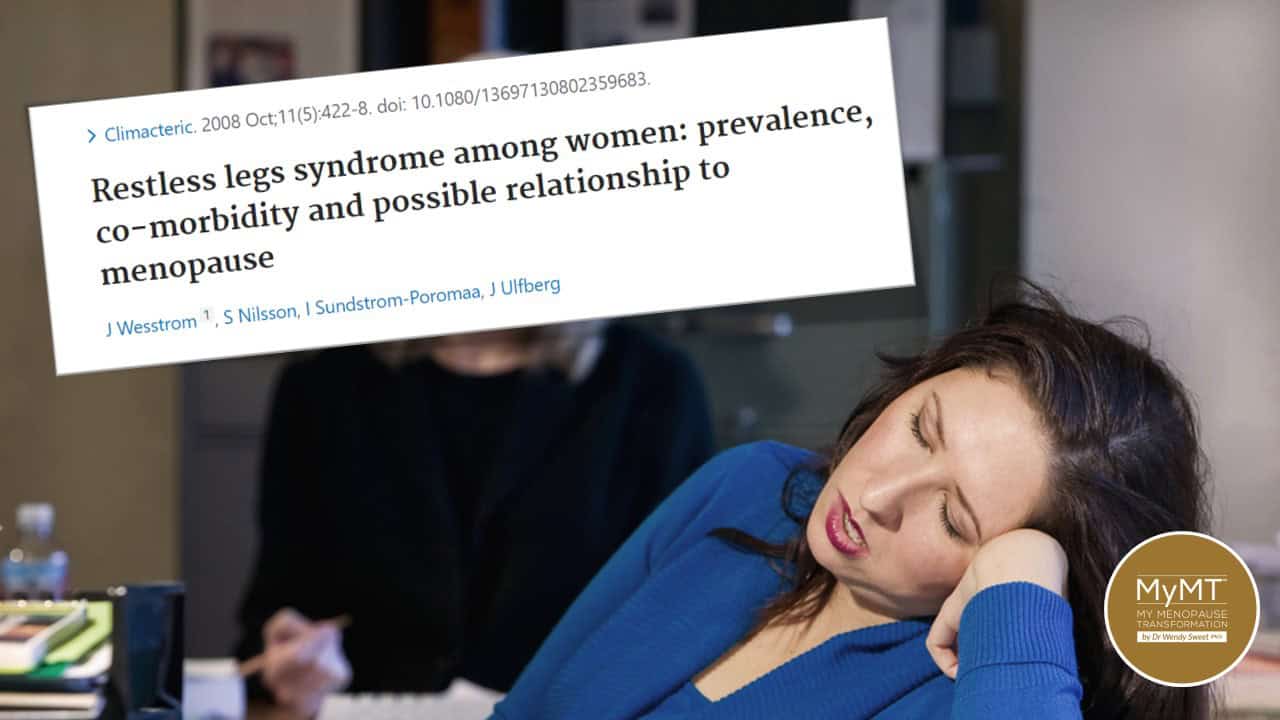
Restless Leg Syndrome (RLS) is defined by the following criteria as determined by the International RLS Study Group (Nagandla & De, 2013):
- An urge to move the legs and usually, but not always, it is associated with leg discomfort such as muscle cramps and/or pain and tingling.
- A worsening of symptoms at rest, either lying or sitting.
- Partial and temporary relief of symptoms by activity.
- Worsening of symptoms and/or sensations later in the day or at night.
Many of you might already have experienced Restless Leg Syndrome when you were pregnant. I can’t quite remember whether I did or not. But if you did, and it’s reared its ugly head again now that you are in your menopause transition, then don’t be surprised.
Not only is the prevalence of RLS twice as high in females as in males, but it is one of the most common movement disorders during pregnancy and as such, women have a four-fold increased risk of developing it in later life (Nagandla & De, 2013) …. For those troubled with the twitching and aching, yes, the term ‘later life’ also means middle-aged menopause.
‘The consequences of RLS are related to sleep disruption that has a negative impact on the daily activities of those experiencing it.’ (Nagandla & De, 2013, p. 402). Some of us already know this don’t we?
But here are the interesting factors that research suggests is associated with why we may develop Restless Leg Syndrome:
- There appears to be a substantial bidirectional association between Irritable Bowel Syndrome and Restless Leg Syndrome. [Guo, Pei, Chen et al, 2021]
- Emerging evidence suggests that low iron or low ferritin (stored iron) levels and low brain iron levels may contribute to the syndrome because iron is a co-factor for one of our brain hormones that help with sleep. This hormone is dopamine.
- Vitamin and mineral deficiencies, such as Vitamin D. calcium and magnesium deficiency, may also predispose women to RLS (Wali, Alsafadi et al, 2018).
- Restless legs syndrome (RLS) is associated with prevalent coronary artery disease and cardiovascular disease, including high blood pressure. (Winkelman, Shahar et al, 2008).
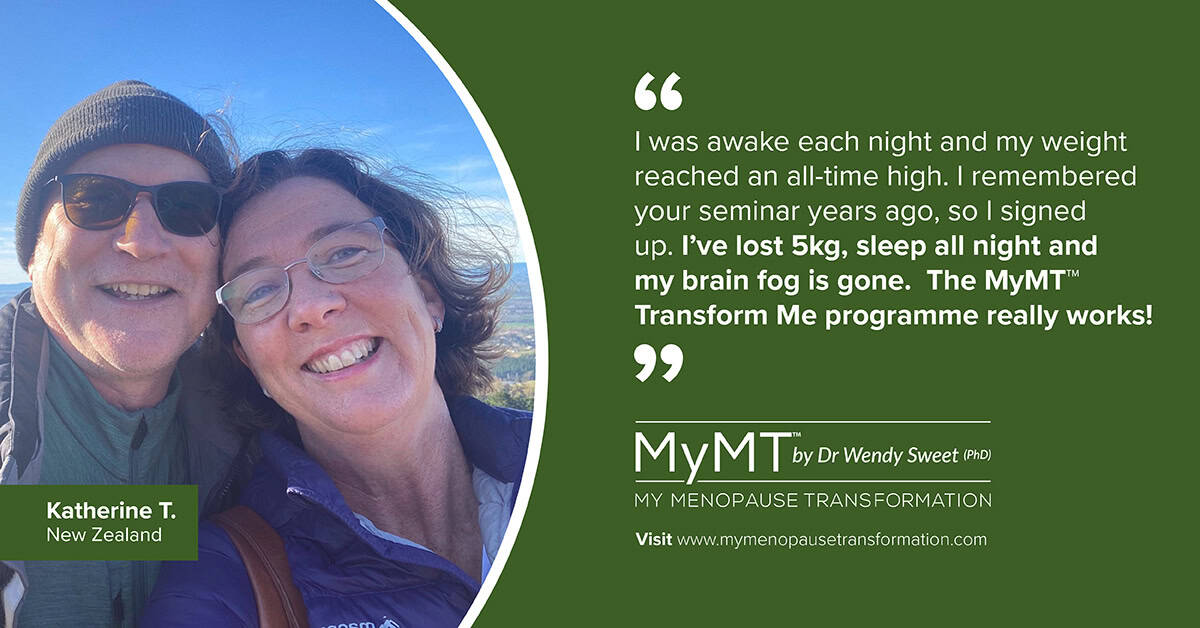
Tips to Help Resolve your Restless Legs
- Talk to your Doctor and ask for a blood test for iron, ferritin (stored iron) and Vitamin D. If iron levels are low, then this impacts the ability of red blood cells to carry iron to your brain. As well, low Vitamin D is associated with calcium uptake and absorption and when calcium levels are low, then this impacts the nerve-muscle connection and the muscle contraction.
- Low Vitamin D also impacts muscle recovery from exercise which in sport and exercise science is known to cause ‘twitching’. There are also medications which may help with your restless legs, so please ensure you ask your Doctor about this aspect of management too.
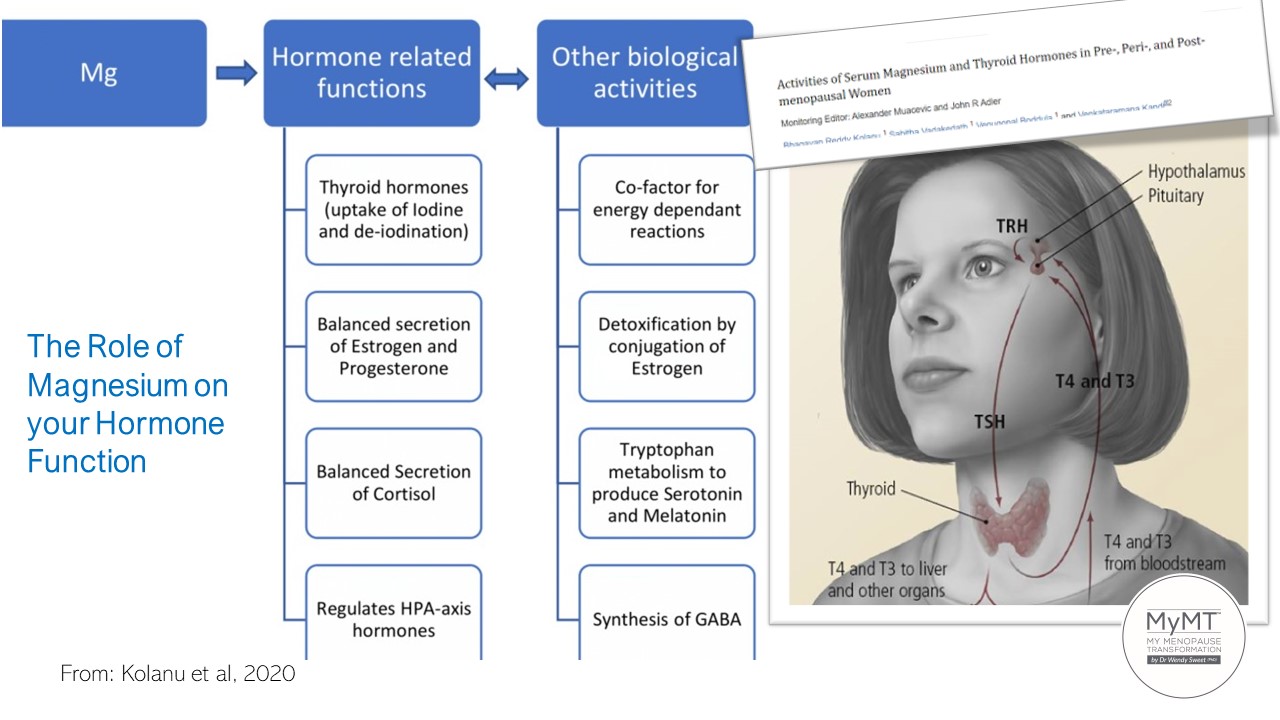
- Explore your magnesium intake – start with your diet and then add supplements as you need to. As we move into post-menopause, women need up to 400mg daily. Twitches, tremors and muscle cramps are also signs of magnesium deficiency.
- Restore and rejuvenate your gut health. I’ve written extensively about gut health and how this changes in menopause and how we become vulnerable to leaky gut syndrome and Irritable Bowel Syndrome (IBS). This may be having a flow-on effect on the absorption and bio-availability of nutrients that your body needs to help reduce Restless Legs Syndrome. I talk about gut health in my online MyMT™ Masterclass on Menopause, which I describe to you in the video below and how you can purchase this for only NZ$15/ AUS$13/ CAN$11/ UK£7/ €8. Have a listen when you can.
- Focus on a heart healthy diet, such as the Mediterranean Diet. Restless legs syndrome (RLS) is associated with prevalent coronary artery disease and cardiovascular disease. The female heart undergoes considerable change when oestrogen and progesterone decline with ageing.
Hence, menopause really does matter to women’s health as they move into their post-menopause years.
How we transition through menopause especially matters to the changing nature of our blood pressure, and if you are still experiencing hot flushes and you are in post-menopause, then don’t blame the menopause – because it’s not. It’s the natural ageing of your heart muscle, nerves and vascular system (blood vessels).
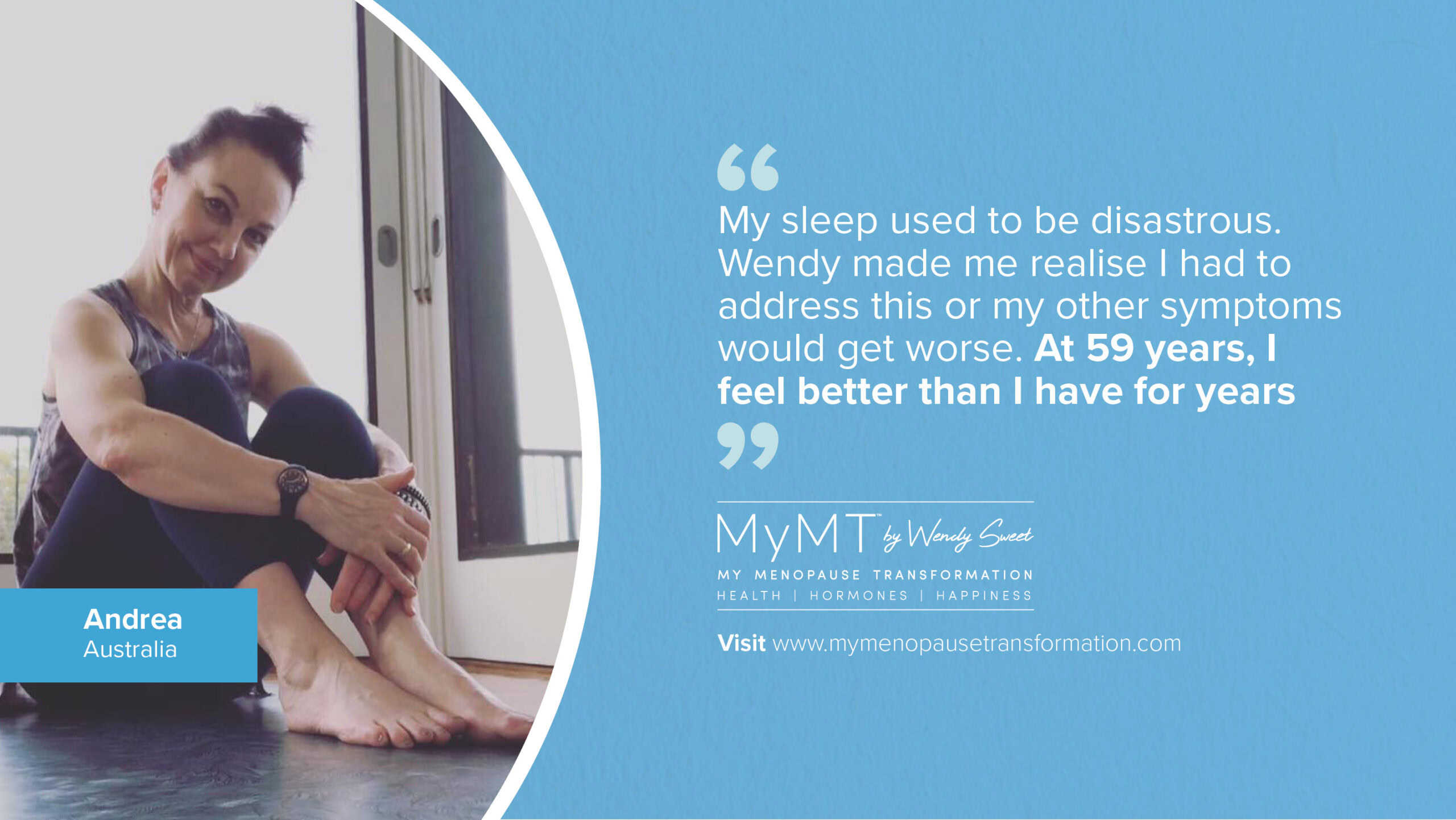
Restless Leg Syndrome isn’t fun. For me personally, it led to extraordinary muscle cramping, whereby I had to get up and stretch in the early hours of the morning.
Not only did this interrupt my sleep, but left me baffled as to what was happening and why. So, yes please, get it checked out when you can and focus on changing up your diet and your nutrients. We’ve had a lot of conversations about it in my coaching groups and I talk about it in the MyMT™ programmes.
Restless legs syndrome (RLS) is a sensory-motor disorder characterized by discomfort of and urge to move the legs, primarily during rest or inactivity, partial or total relief with movement, with presence or worsening exclusively in the evening.
With it arriving in mid-life, it can be hidden from the exhausting list of other symptoms that distract us.
As a disorder that impacts the nerves and muscles however, we must also remember that our muscles and nerves are changing with age. So too, is our gut health. Hence, we might not be able to absorb the nutrients that our muscles and nerves desperately need as we transition menopause.
According to the research on RLS, sufferers more often also experience depression and heart disease, both which also become worse with gut health problems, low Vitamin D and low (or high) iron. Hence, please don’t ignore your restless legs!
Women on my programmes know that watching their iron, ferritin and Vitamin D levels are an important aspect of helping themselves during menopause.
Whilst much of the emphasis for our menopause symptoms is centred on menopause HRT, please don’t forget that you can do so much more to adjust your lifestyle, exercise and nutrition too. Midlife is a wonderful time of your life to take stock of your health and how we move through this stage of life matters.
I hope you can explore the MyMT™ programmes sometime and if you come on board with me for 12 weeks, I will be with you every step of the way.
Dr Wendy Sweet (PhD) MyMT™ Founder/ Member: Australasian Society of Lifestyle Medicine.
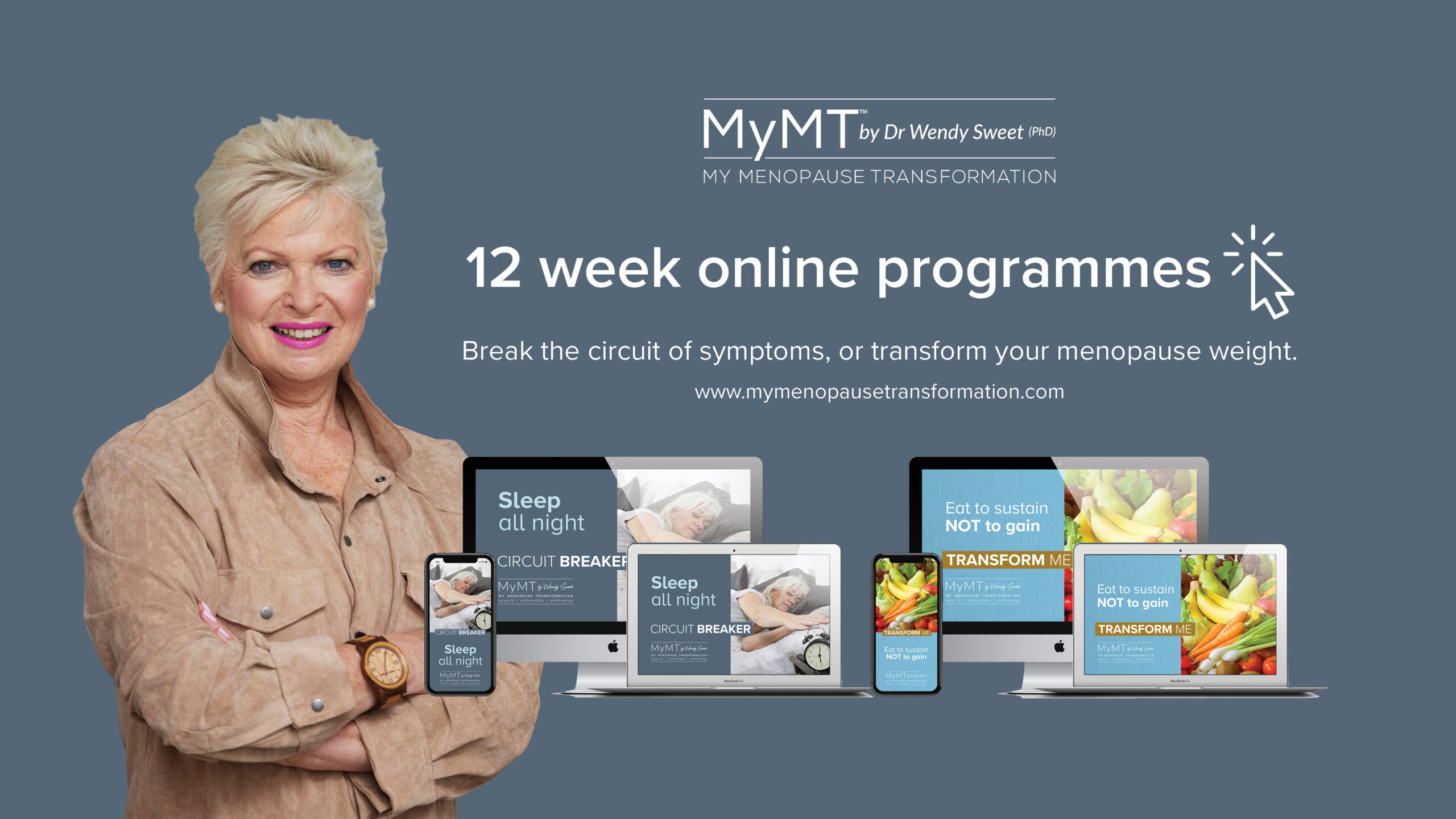
References:
Al Alawi AM, Majoni SW, Falhammar H. Magnesium and Human Health: Perspectives and Research Directions. Int J Endocrinol. 2018 Apr 16;2018:9041694.
Guo, J., Pei, L., Chen, L. et al. (2021). Bidirectional association between irritable bowel syndrome and restless legs syndrome: a systematic review and meta-analysis. Sleep Medicine, 77, 104-111. ISSN 1389-9457.
Khoudary, S., Aggarwai, B., Beckie, T., et al (2020). Menopause Transition and Cardiovascular Disease Risk: Implications for Timing of Early Prevention: A Scientific Statement From the American Heart Association. Circulation, 142: e506–e532
Maas, A. (2019). A woman’s heart. why female heart health really matters. Great Britain: Aster Publ.
Milart, P., Woźniakowska, E., & Wrona, W. (2018). Selected vitamins and quality of life in menopausal women. Przeglad menopauzalny = Menopause review, 17(4), 175–179.
Pesonen, H., Laakkonen, E.K., Hautasaari, P. et al. Perimenopausal women show modulation of excitatory and inhibitory neuromuscular mechanisms. BMC Women’s Health 21, 133 (2021).
Seeman M. V. (2020). Why Are Women Prone to Restless Legs Syndrome? International journal of environmental research and public health, 17(1), 368. https://doi.org/10.3390/ijerph17010368
Wali S, Alsafadi S, Abaalkhail B, Ramadan I, Abulhamail B, Kousa M, Alshamrani R, Faruqui H, Faruqui A, Alama M, Hamed M. (2018). The Association Between Vitamin D Level and Restless Legs Syndrome: A Population-Based Case-Control Study. J Clin Sleep Med. 15;14(4):557-564. doi:
Wesstrom J, Nilsson S, Sundstrom-Poromaa I, Ulfberg J. Restless legs syndrome among women: prevalence, co-morbidity and possible relationship to menopause. (2008). Climacteric, 11(5):422-8. doi: 10.1080/13697130802359683. PMID: 18781488.
Winkelman J., Shahar E., Sharief I., Gottlieb D. (2008). Association of restless legs syndrome and cardiovascular disease in the Sleep Heart Health Study. Neurology. 1;70(1):35-42. doi: 10.1212/01.wnl.0000287072.93277.c9. PMID: 18166705.
Zucconi M, Ferini-Strambi L. Epidemiology and clinical findings of restless legs syndrome. (2004). Sleep Med. 5(3):293-9. doi: 10.1016/j.sleep.2004.01.004. PMID: 15165538.
